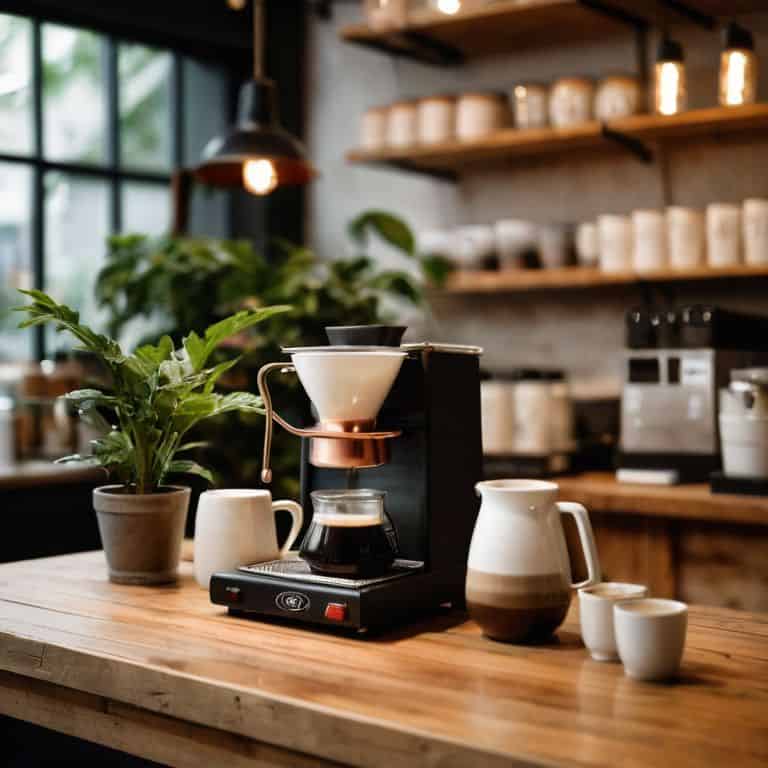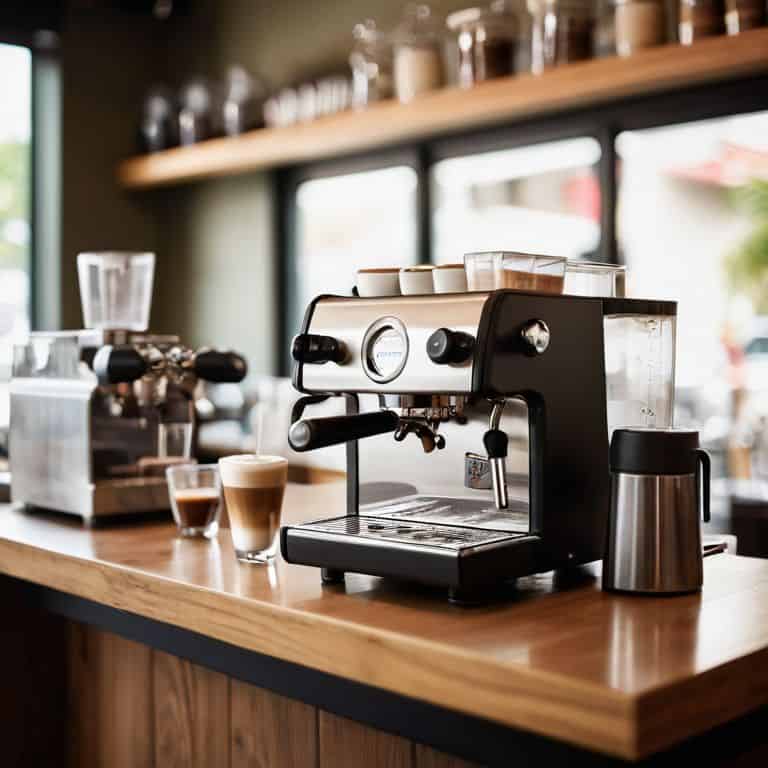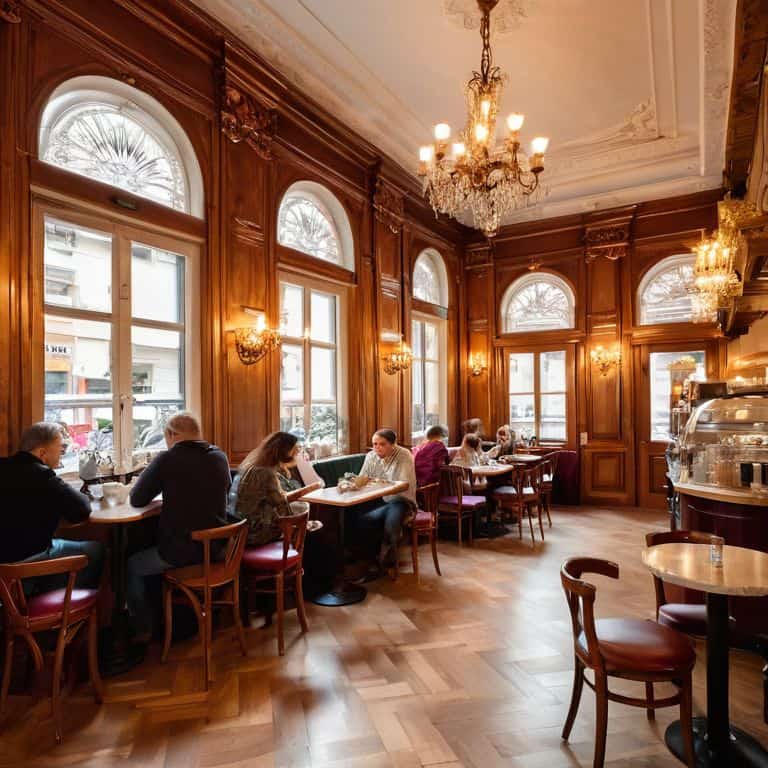As I sit in my favorite Viennese coffee house, surrounded by the whispers of history and the aroma of freshly brewed coffee, I am reminded of the profound connection between coffee and creativity. It’s a relationship that has been touted as a panacea for artistic expression, but one that I believe has been oversimplified by the notion that a mere cup of coffee can spark genius. I’ve spent years researching the social role of coffee in different cultures, and I’ve come to realize that the true magic lies not in the coffee itself, but in the conversations, the community, and the cultural context in which it is consumed.
In this article, I promise to take you on a journey through the hidden harmony between coffee and artistic expression, one that is rooted in my own experiences as a food historian and author. I’ll share with you the stories behind the brew, from the coffee houses of 18th-century Europe to the modern-day cafes that foster innovation and collaboration. My goal is to provide you with a nuanced understanding of how coffee can inspire creativity, not as a quick fix or a gimmick, but as a catalyst for community and a spark for the imagination. By exploring the rich history and cultural significance of coffee, I hope to inspire you to rethink your daily ritual and tap into the creative potential that lies within.
Table of Contents
- Coffee and Creativity
- Fueling Artistic Expression
- Coffee Rituals for Productivity Unlocking Your Full Potential
- Historical Coffee Houses Where Literature Meets Art
- Brewing Inspiration: 5 Tips to Unlock Coffee's Creative Potential
- Key Takeaways: Where Coffee Meets Creativity
- Brewing Inspiration
- The Perfect Brew: Where Coffee and Creativity Unite
- Frequently Asked Questions
Coffee and Creativity
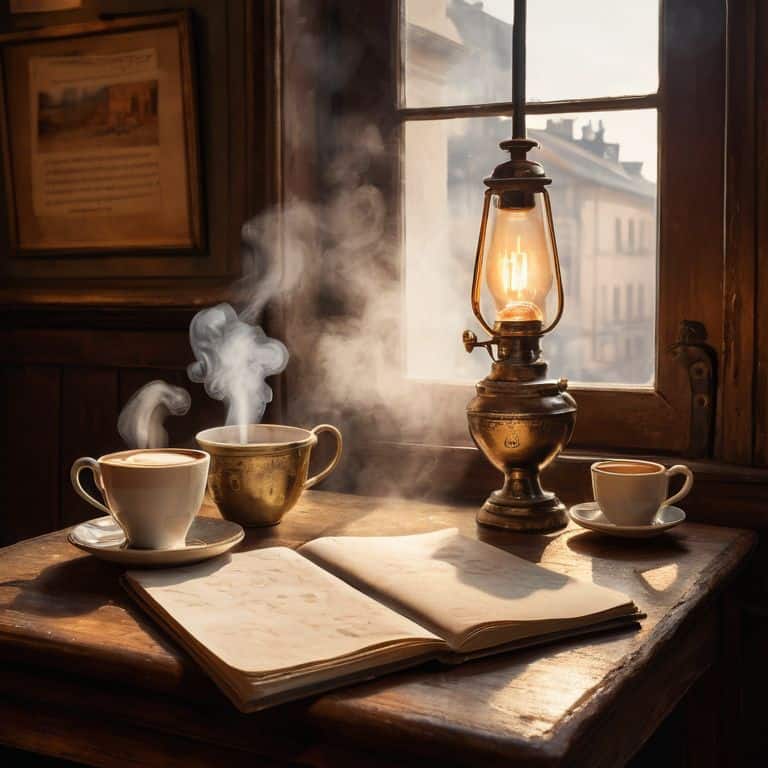
As I sit in my favorite historic cafe, surrounded by the worn wooden panels and the soft glow of antique lamps, I am reminded of the intricate dance between coffee and artistic expression. The aroma of freshly brewed coffee wafts through the air, transporting me to a world where ideas flow freely and creativity knows no bounds. It’s as if the rich flavors and aromas of the coffee have a profound impact on my cognitive function, allowing me to tap into a deep well of inspiration.
In the world of literature, coffee culture has long been a beloved muse, inspiring some of the most iconic writers and poets in history. From the grand coffee houses of 18th century Europe to the quaint, bohemian cafes of modern-day Paris, coffee has played a starring role in the development of some of the most influential works of art. The science of coffee and inspiration is a fascinating topic, with studies showing that caffeine can have a profound impact on our ability to think creatively and productively.
As I sip my coffee and watch the world go by through the steam-stained windows, I am struck by the historical significance of coffee houses as hubs of artistic expression. From the Impressionists to the Beats, coffee has been a constant companion to some of the most innovative and groundbreaking movements in art and literature. Whether it’s the coffee rituals for productivity or simply the comforting warmth of a well-crafted cup, it’s clear that coffee has played a quiet yet pivotal role in shaping the course of creative history.
Brewing Genius Coffee as a Muse
As I sit in my favorite café, surrounded by the gentle hum of conversation and the aroma of freshly brewed coffee, I am reminded of the profound impact that coffee has on the creative process. The rich flavors and bold notes of a well-crafted cup seem to awaken the senses, stirring the imagination and inspiring new ideas.
In the stillness of the morning, as the city awakens, I find that sipping coffee can be a meditative experience, allowing me to tap into my inner world and access the hidden recesses of my mind, where creativity and innovation reside.
Caffeine and Cognitive Function the Science Behind Inspiration
As I sit in my favorite café, surrounded by the soft murmur of conversations and the aroma of freshly brewed coffee, I ponder the mysterious connection between caffeine and creativity. It’s as if the stimulating effects of coffee awaken a part of our mind, allowing us to tap into a deeper well of inspiration.
The science behind this phenomenon is fascinating, with neurotransmitter regulation playing a crucial role in enhancing our cognitive function, and ultimately, our creative potential.
Fueling Artistic Expression
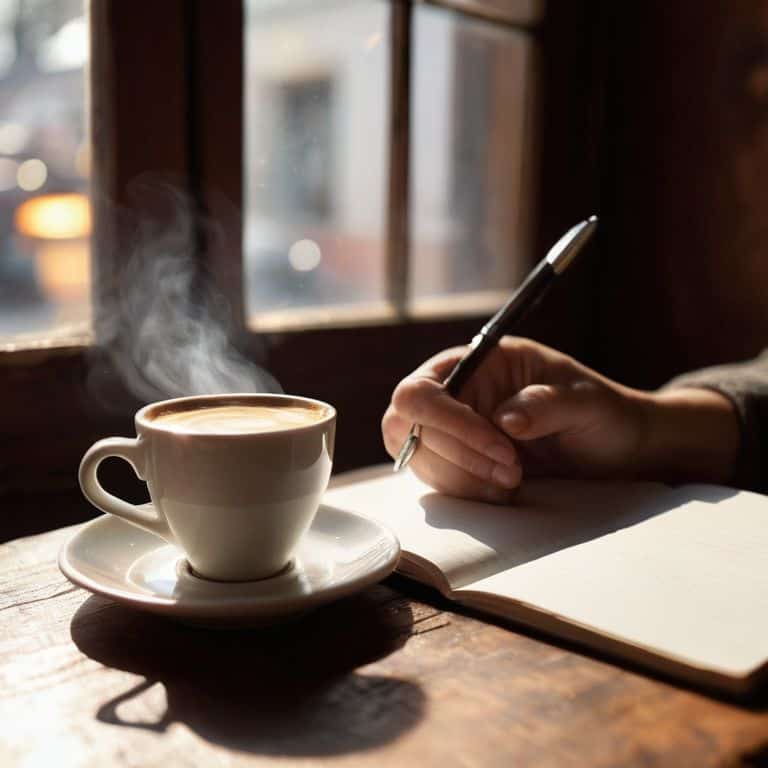
As I sit in this quaint, historic café, surrounded by the whispers of worn wooden tables and the aroma of freshly brewed coffee, I am reminded of the profound impact of coffee as a muse on artistic expression. The soft glow of the morning sun casts a warm light on the pages of my notebook, as I scribble down lines of poetry inspired by the rich flavors of my espresso. It’s as if the caffeine is coursing through my veins, awakening my senses and unleashing a torrent of ideas.
In the world of literature, coffee culture has long been a staple of intellectual and artistic gatherings. From the likes of Voltaire to Kafka, many renowned writers have found solace in the humble coffee house, where the atmosphere is ripe for conversation and creativity. The science behind this phenomenon lies in the realm of caffeine and cognitive function, where the stimulant’s ability to enhance focus and mental clarity has been well-documented. As I ponder the intersection of art and science, I am struck by the realization that coffee is more than just a beverage – it’s a catalyst for innovation.
As I delve deeper into the world of coffee and art, I find myself drawn to the historical coffee houses that have played host to some of the most iconic figures in literature and art. From the grand cafes of Vienna to the charming bistros of Paris, each establishment has its own unique character and charm, shaped by the coffee rituals for productivity that have been passed down through generations. As I sip my coffee and listen to the gentle hum of conversation around me, I am filled with a sense of wonder and awe at the profound impact that this simple beverage has had on the world of art and literature.
Coffee Rituals for Productivity Unlocking Your Full Potential
As I sit in my favorite café, surrounded by the gentle hum of conversation and the aroma of freshly brewed coffee, I find myself in a state of flow, where ideas seem to emerge from the steam rising from my cup. The ritual of sipping coffee, feeling the warmth of the cup in my hands, and savoring the flavors, has a profound impact on my productivity. It’s as if the sensory experience of coffee awakens my senses, allowing me to tap into my creative potential.
In this sacred space, time stands still, and all that matters is the present moment, where the only sound is the gentle clinking of cups and the soft murmur of conversation, creating a sense of camaraderie among strangers. As I people-watch and let my mind wander, I become more receptive to new ideas, and my thoughts begin to unfold in unexpected ways, revealing hidden connections and insights that might have otherwise gone unnoticed.
Historical Coffee Houses Where Literature Meets Art
As I sit in these venerable establishments, I am reminded of the rich cultural heritage that permeates every corner. The soft glow of lamp posts, the murmur of hushed conversations, and the aroma of expertly brewed coffee all combine to create an atmosphere that is at once nostalgic and inspiring.
In these historic coffee houses, I have found that literary masterpieces were often born, as writers and artists gathered to share ideas and inspire one another. The likes of Kafka, Freud, and Klimt frequented such establishments, finding solace in the warm and welcoming environment that fostered creativity and innovation.
Brewing Inspiration: 5 Tips to Unlock Coffee's Creative Potential
- Start your day with a sensory experience: savoring a rich, slow-brewed coffee in a historic cafe to awaken your senses and spark imagination
- Experiment with coffee pairing: matching distinct coffee blends with specific artistic tasks to discover how different flavors and aromas influence your creative process
- Establish a pre-creative ritual: using the deliberate, meditative act of preparing coffee as a transition into a focused, artistic mindset
- Find your optimal caffeine balance: understanding how the right amount of caffeine can enhance your cognitive function and boost creativity, without overwhelming your senses
- Make conversation a catalyst: using coffee as a social glue, engaging in meaningful discussions with fellow creatives in cozy coffee shops to cross-pollinate ideas and inspire innovation
Key Takeaways: Where Coffee Meets Creativity
As I sit in my favorite historic cafe, surrounded by the whispers of the past and the aroma of expertly brewed coffee, I am reminded that the true magic of coffee lies not just in its flavor, but in its ability to spark creativity and inspire artistic expression.
Coffee has been the silent companion to many a literary and artistic genius throughout history, from the likes of Mozart to Hemingway, and its role in fueling imagination and innovation cannot be overstated – a fact that I’ve had the privilege of exploring in my own research and writing.
Whether you’re a writer, artist, or simply someone who appreciates the beauty of a well-crafted cup, embracing the ritual of coffee can be a powerful catalyst for creativity, productivity, and connection – a notion that I’ve seen play out time and again in the charming coffee houses I’ve had the pleasure of visiting around the world.
Brewing Inspiration
In the realm of coffee and creativity, it’s not just the caffeine that sparks the mind, but the centuries-old traditions, the whispered conversations, and the timeless beauty of a well-crafted cup that awakens the muse within us.
Isabella Marino
The Perfect Brew: Where Coffee and Creativity Unite
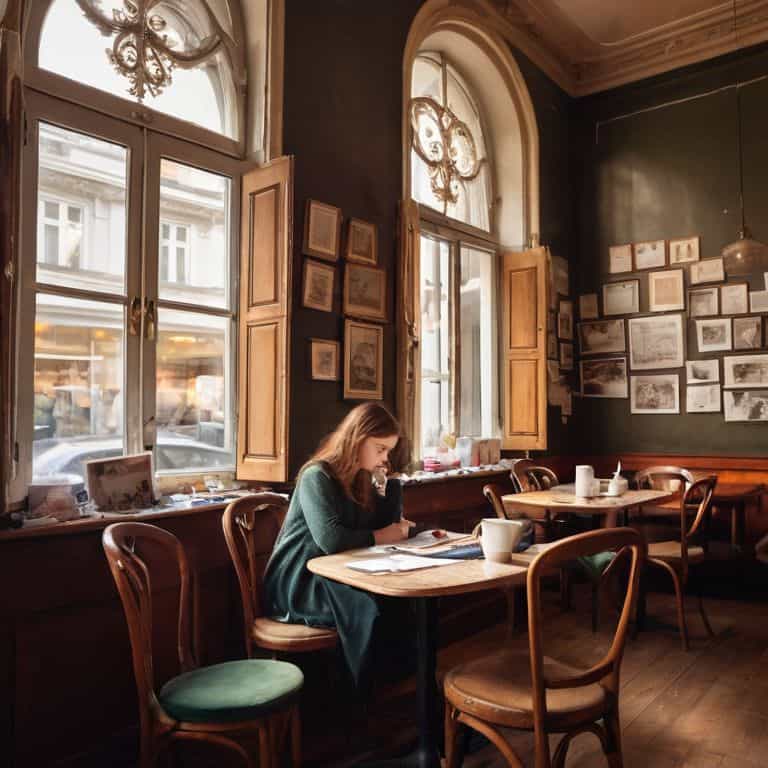
As I sit here, sipping my coffee and reflecting on the journey we’ve taken, I’m reminded of the profound impact coffee has had on the world of art and literature. From the historic coffee houses of Vienna to the modern-day cafes that dot our city streets, coffee has played a significant role in fueling creative genius. We’ve explored the science behind caffeine’s effects on cognitive function, and delved into the world of coffee rituals that help unlock our full potential. Whether you’re a writer, artist, or musician, coffee has the power to transport you to a world where ideas flow freely and inspiration knows no bounds.
So as you finish your cup and head out into the world, I encourage you to slow down and appreciate the simple joys of coffee. Let the flavors and aromas envelop your senses, and allow yourself to get lost in the stories and conversations that flow from the cup. For in the end, it’s not just about the coffee – it’s about the people, the places, and the experiences that make life worth living. And as I always say, the soul of a city can be found in its oldest coffee shop – so go out, explore, and find the heart of your city, one cup at a time.
Frequently Asked Questions
How do different coffee cultures around the world influence the creative process of artists and writers?
As I’ve sipped coffee in cafes from Vienna to Tokyo, I’ve noticed how each culture’s unique coffee traditions inspire artists and writers. In Paris, the rich aromas of a traditional café au lait fuel philosophical debates, while in Istanbul, the intricate patterns on Turkish coffee cups spark poetic musings, illustrating how diverse coffee cultures nurture creativity.
Can the ambiance and atmosphere of a coffee shop alone inspire creativity, or is it the coffee itself that plays a role?
For me, it’s the harmonious blend of both – the ambiance of a historic coffee shop, with its worn wooden tables and soft murmur of conversation, coupled with the rich flavors of a expertly brewed cup, that sparks creativity and inspires the mind.
Are there any specific coffee rituals or brewing methods that are particularly conducive to fostering creative thinking and problem-solving?
As I sit in my favorite café, I find that a traditional Turkish coffee or a pour-over brewing method helps me tap into my creative potential. The deliberate, mindful process of preparing these coffees clears my mind and allows me to focus on the task at hand, much like the artists and writers who once gathered in Vienna’s legendary coffeehouses.

